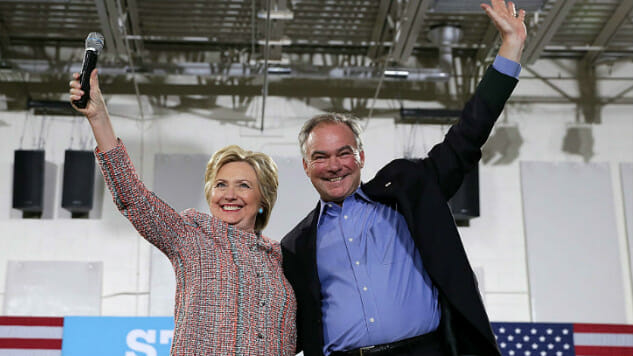Tim Kaine and the Democrats’ Defense of Abortion
Photo by Alex Wong/Getty
When I was much younger, and the way people made babies was truly sinking in, I was staunchly anti-abortion. If you were responsible enough to have sex, I reasoned haughtily and rather judgmentally, you were responsible enough to have a baby. Then I started actually having sex, and my views relaxed considerably.
Now that I have had a child, I must admit that I’m back to being uncomfortable with abortion. I believe that life, or the potential for it, begins at conception. I’m not sure that I see a difference between this early life and it being merely “potential”, because won’t its journey to become a baby only be derailed if something goes wrong? I’m not sure, but what I am sure of is that my personal misgivings don’t stop me from being adamantly pro-choice.
I am pro-choice because I understand that I am privileged enough to have always had the financial and family support to have a baby at any age, if a partner and I had found ourselves in that position. A baby would not have limited my life choices. I understand that even if a clump of cells is, for me, already a life, it does not have more rights than the mother. It is not only her mental and physical well being that are factors, but also what she considers to be the right choice for her, for any reason. As I will never walk in her shoes, I cannot judge. Her reproductive choices are none of my business, but I can stand up for her right to make those choices privately and safely.
All this is why it is so important that the term “abortion” was finally said at a major political convention this week. The Democratic convention to nominate Hillary for president prominently featured abortion on its agenda. Speakers included Cecile Richards, president of Planned Parenthood, Ilyse Hogue, president of NARAL Pro-Choice America and Stephanie Schriock, president of Emily’s List.
Creating headlines across the political world, Richards was the first person to say the word “abortion”, not euphemisms such as “pro-choice” or “termination”, in a convention speech touting HRC’s commitment to defending reproductive rights. She was also strategically seated with Bill Clinton, highlighting the future First Couple’s willingness to be publicly and personally linked to the cause. Last night, the divide between Republican and Democratic policies was even more stark as Ilyse Hogue took to the stage to speak about her own abortion.
Hogue was brave. While women in political life have spoken about ending their pregnancies before, it has generally been due to medical complications. The fetus was non-viable, or the woman’s health was at risk. Hogue said that her pregnancy occurred during graduate school, and it simply wasn’t the right time. She has gone on to have two children when the timing was right for her and her family. Importantly, she tried to break the false dichotomy that “bad girls have abortions and good girls have families.” Women who are already mothers may have an abortion, career women, students, unemployed; for financial reasons, emotional reasons, or simply because she doesn’t want a child. Whereas the Republican Party has sought to demonize and – according to a since-modified statement by their Presidential Nominee Trump – punish abortion-seekers and their doctors, the speakers at the Democratic Convention have sought to humanize them.
-

-

-

-

-

-

-

-

-

-

-

-

-

-

-

-

-

-

-

-

-

-

-

-

-

-

-

-

-

-

-

-

-

-

-

-

-

-

-

-








































